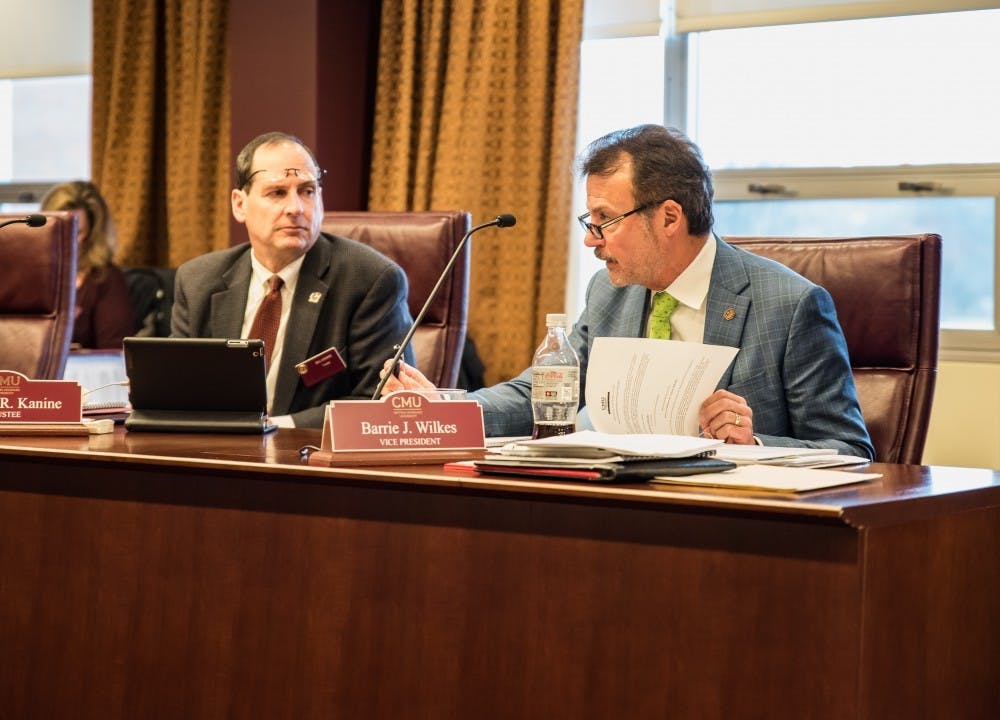$225 Student Services Fee to go directly to campus safety and health services

Vice President of Finance and Administrative Services Barrie Wilkes, right, speaks at the Board of Trustees meeting on Dec. 6, 2017 in the Bovee University Center.
Beginning in the Fall 2018 semester, Central Michigan University students will be charged an additional $225 on top of tuition to fund "student services."
When the fee was implemented last month, more than 19,000 students were charged multiple times for the fee. On Aug. 6, Student Account Services and University Billing sent an email to affected students. The email read: "Many CMU student accounts were mistakenly charged multiple times this weekend for the $225 Student Services Fee. We have adjusted all affected accounts so the fee is assessed just once. You will see these transactions on your student billing account. We apologize for the inconvenience and confusion."
Until June, Central Michigan University was the only public university in Michigan to not charge lower level/ upper level tuition, block tuition, program- or course-specific tuition, or mandatory fees, according to the Michigan Association of State Universities 2017-18 report on tuition and fees.
That changed this summer. The CMU Board of Trustees approved a mandatory $225 Student Services Fee at its June 28 meeting. The funds raised by the fee will primarily go toward campus safety and health services.
Vice President of Finance and Administrative Services Barrie Wilkes said CMU used to charge fees separate from tuition but eliminated them in 2005 with the implementation of the CMU Promise.
The CMU Promise was introduced by former President George E. Ross, when he served as the vice president for finance and administrative services and treasurer, the position Wilkes has now.
The program gave new in-state students a flat tuition rate that wouldn’t change during up to five years at CMU. The program ended in 2008.
Since then, tuition has increased every year from $304 per credit in 2008 to $417 per credit in 2018. Administrators have avoided tacking on extra fees and focused on keeping tuition the same for every student — other universities charge different rates depending on class standing and program — until this summer, Wilkes said.
Director of Financial Planning and Budgets Joe Garrison said the idea to implement a fee had been tossed around for a few years, but became a serious possibility this spring.
"Feb. 1 we get enrollment numbers," Garrison said. "Then we start modeling how it would look with different tuition rates."
With the student services fee, the revenue generated will go directly to student services like campus safety and health services.
"We wanted to identify a fee that we would be able to direct toward (student) services without having to run (the money) through our typical budget model, where it is allocated out differently," Wilkes said.
With the way the budget is set up, tuition dollars are collected and distributed to colleges first. With a typical tuition increase, the money wasn’t guaranteed to go specifically to student services.
“When it comes to fee versus tuition, the way our budget model works, a portion of that tuition automatically flows to the colleges, and only a specific portion would come back and be assigned to centralized services," Garrison said. "It's a more decentralized model where colleges have more autonomy."
An exact breakdown of where the revenue from the fee will be spent is not available. Some money has been allocated to the CMU police department to hire additional officers and to the counseling center to hire more counselors. The board of trustees provided a list in June of where the fee would be spent, which includes:
- Academic advising efforts
- Career development and placement services
- Counseling services
- Leadership development for all students
- Financial wellness and management initiatives
- Mentoring and success coaching
- Student engagement programming
- Student recreation and wellness
- Technology upgrades and support
- Campus safety
Garrison stressed that no revenue from the fee would be used for capital projects. The fee didn't pay for new signs, the archway on Broomfield and isn't intended to be used on other construction projects.



